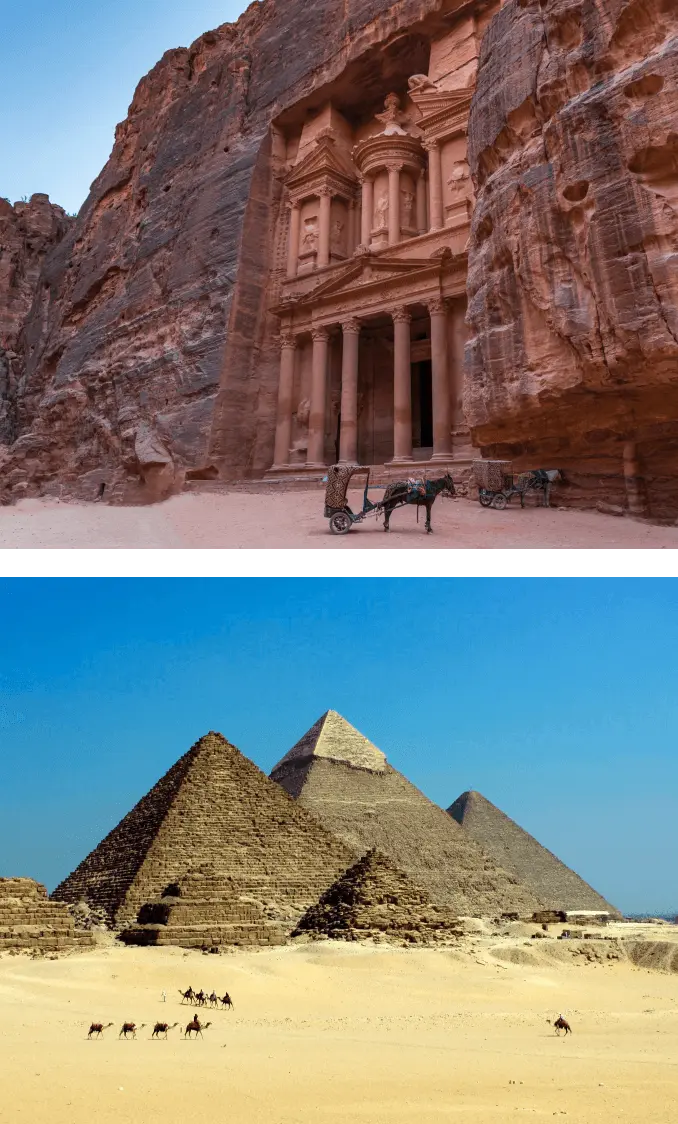Arabic Classes with Native Arabic Tutors
Book a Course Now
If you are looking to learn a new language to boost your career, Arabic is an ideal choice. Being fluent in Arabic will not only open up professional doors for you if you intend to work in an Arabic-speaking country but also at home. Total trade between the UK and the United Arab Emirates amounted to £17.7 billion in 2020 while only 0.3% of the UK’s population are fluent in Arabic, so proficiency in this language will certainly make you stand out.
Learning Arabic will also help you discover and understand fascinating countries and cultures, as you’ll be able to read and listen to songs, books, magazines, TV shows and other media products in Arabic without using translations. Plus, if you ever plan to visit one (or some) of the many countries where Arabic is a native tongue, you’ll be more than prepared to connect with locals and discover non-touristic spots that would not be accessible to monolingual speakers only.
Are you ready to take the leap? Read this guide on how to learn Arabic and discover the best tips and resources to take your foreign language skills to the next level today!
Language Trainers organizes Arabic courses in almost any destination!
All classes are taught by qualified, native speaker Arabic trainers and can be arranged at your office or home for any day of the week (including weekends) in the morning, afternoon or evening.
City Quick Search
Arabic lessons in...
1. Where is Arabic Spoken?
Arabic is spoken in 25 countries, mostly concentrated in the North of Africa, the Middle East, and the Arabian Peninsula, and all of them have their own variety.
These countries are:
Of course, there are thousands of Arabic speakers living elsewhere in the world. For example, 4% of Belgium’s, 2.5% of France’s, and 1.5% of the United Kingdom’s population is made up of Arabic speakers. Other countries with significant Arabic-speaking populations include the United States and Brazil.
Being fluent in Arabic, then, is crucial for you to communicate with millions of people and connect with them on a whole new level. If you ever visit an Arabic-speaking country, you’ll be able to speak to them fluently and even discover some jewels hidden to tourists who cannot communicate in Arabic.
But knowledge of this fascinating language is not only useful to make new friends. If you work in the fields of energy, construction, or technology (or wish to look for a job at an Arabic-speaking company), then you’ll need to be as fluent as possible. Only 3.6% of the population in Saudi Arabia speaks English, for example, so a working knowledge of the official language of the country will turn you into an asset that companies won’t want to miss.
Not convinced about learning Arabic yet? Read our blog and discover the top 5 reasons you should start studying Arabic today!
What Arabic Should I Learn?
As mentioned above, Arabic has many varieties and dialects that, most of the time, are not mutually intelligible. This means you’ll need to choose wisely what type of Arabic you want to acquire, because the terms you learn in Egyptian Arabic, for example, will not probably be understood in Lebanon. So, what type of Arabic should you learn?
The answer is simple: the one you need the most. Think about why you want to learn the language. Do you have friends or family living in Iraq? You should learn Iraqi Arabic. Are you travelling to Jordan soon? Study Jordanian Arabic. Are you interested in the language itself and don’t have an immediate intention to speak to others? Then, Modern Standard Arabic (MSA) is the best option for you.
Also called Literary Arabic, MSA is based on Classical Arabic and became the lingua franca for speakers of different Arabic varieties to communicate with each other, but mostly in formal settings. Today, most media broadcasts, schoolbooks, official documents, and written materials in general are written in MSA but, at home, people tend to speak in their local variety.
There’s no real reason to learn a dialect different from the one you really need unless you cannot find any resources or teachers who can help you acquire it (don’t worry, this won’t happen if you book lessons with us at Language Trainers!).

2. The Arabic Language: Why It’s Not That Difficult
You’ve probably heard it all before: that the Arabic alphabet is impossible to learn, pronunciation is too complicated, there are too many new terms to acquire… While these statements are not entirely wrong (Arabic can be tough to learn, after all!), many elements of the language are simpler than they think.
For example, the pronunciation system is quite straightforward, with only a couple of sounds that do not exist in English. The grammar system is also easy to learn, as you’ll find there are just two tenses: past and non-past. Regarding the alphabet, it has 28 letters made of 5 basic shapes. The most difficult part is that you’ll need to get used to reading and writing from left to right instead of right to left while you get familiar with the abjad, an alphabet made of consonants and only a few vowels. This adds another level of difficulty: you may not have a clue of how to pronounce words when seeing them for the first time.

Algeria

Bahrain

Chad

Comoros

Djibouti

Egypt

Eritrea

Iraq

Jordan

Kuwait

Lebanon

Libya

Mauritania

Morocco

Oman

Palestinian Territories

Qatar

Saudi Arabia

Somalia

Sudan

Syria

Tanzania

Tunisia

United Arab Emirates

Yemen
While it may be tempting to stick to transliterations and avoid the alphabet at the beginning, this may not be the wisest choice. Instead, you should try to learn new words together with an audio file (or a good teacher) that shows their correct pronunciation so you start getting familiar with both spelling and phonology at the same time. Furthermore, it will be difficult to find high-quality materials that do not use the Arabic alphabet, so don’t delay it and take the plunge!

3. How to Learn Arabic with a Teacher
Now that you know how important it is to learn Arabic today, you need to take the bull by the horns and start looking for the best type of course that suits your needs and requirements! Individual and group Arabic classes have their own advantages and limitations and you should consider all of them before choosing a course. For example, individual lessons are much more flexible and personalised in terms of curriculum and schedule but are not so rich in real-life interaction as group courses.
Explore the main benefits of group and individual Arabic lessons in the chart below:
| Individual lessons | Group lessons | |
|---|---|---|
| Type of Interaction | Just 2 people | More varied conversation |
| Personalised Instruction & Feedback | Complete | Partial |
| Control over the schedule | Complete | Partial |
| Learn from peers | No | Yes |
| Intercultural exchange | Depends on the teacher | Yes |
| Cost | More expensive | More affordable |
| Real-life communication | Not always | More likely |
4. How to Learn Arabic for Free
Do you feel ready to start learning Arabic but you are not sure where to start? Here we present you with the best free resources so you can start learning Arabic from your home, at no cost! They are also very useful to complement your one-on-one or group Arabic lessons.
ArabicPod101 is, as the name shows, a great platform to find podcasts in Arabic about virtually any topic. It’s entirely free and features materials suitable for every level of proficiency. Try them out if you would like to give your listening skills a boost!
Are you a frequent social media user and would like to capitalize the time you spend scrolling down Instagram to learn Arabic? Find here 6 artists to follow if you are learning the Arabic language!
One of the main difficulties when learning Arabic is pronunciation and this is when dictionaries like Forvo can help. If you look up a certain word, you won’t find a traditional definition but an audio recording by a native speaker featuring exactly how to say that particular word. Useful, right?
If you are a visual learner, apps with flashcards and animations like Anki or Memrise can be your best companions for learning Arabic. You can decide to use ready-made decks offered by the apps or create your own, adding images, text, and even audio if you prefer!
Those who prefer to learn with video can find countless YouTube channels with bloggers and even teachers sharing their experiences when learning and teaching Arabic. For example, Noor Stars and Shady Srour are some of the best-known Arabic vloggers, with videos ranging from lifestyle and fashion to informal phrases used in different Arabic-speaking countries.
5. Improve Your Arabic Speaking Skills
Learning how to speak fluently and accurately can be the greatest challenge we face as foreign language learners. This can be even more difficult when the language is so different from our native tongue, as in the case of Arabic. If you are a beginner, it’s only natural to start with written resources instead of oral, as they are somewhat easier to manage and you have planning time instead of having to give an immediate response.
However, you should not neglect your speaking skills if you want to participate in conversations successfully! With these tips, you’ll improve your Arabic speaking skills in no time and almost effortlessly!
Start by Reading out Loud
In case you don’t feel ready to have a conversation yet, you can always play safe and start reading materials in Arabic out loud. By doing this, you’ll also realize what words you have already internalized and which ones you still need to look up in a pronunciation dictionary. Read, read, and read until you speak faster and more confidently. It’s even more useful if you have an audio recording of that particular text because you’ll get some feedback by comparing yourself to the native speaker who originally read the text.
Shadowing (or listening and repeat) is also a good technique to start honing your speaking skills, and it can be even more effective if you use materials that interest you, such as movies, TV shows, or even podcasts.

Make mistakes - lots of them!
Wise people say that making mistakes is a signal that you are learning, and they are not wrong! We understand it can be difficult to talk to others while making tons of mistakes, so why not start in a comfortable, safe environment with friends? And if you don’t have any Arabic-speaking acquaintances, you can always book lessons with a native tutor who will adapt speaking lessons to your every need and requirement.
6. How to Learn Arabic Vocabulary
Let’s face it: there’s nothing more tedious when learning a language than struggling to remember long lists of words that look similar to one another. Simply being exposed to certain vocabulary does not mean you understand the words and, even less, that you will remember them the next day. Luckily, there are many techniques you can try out in addition to rote memorization to learn Arabic vocabulary in the most efficient way. Here are some of them!
Flashcards
These are one of the most popular methods for studying vocabulary and it works! You only need to choose what elements to include in your flashcard (in addition to the word itself): be it pictures, audio recordings, definitions, or even phonetic script either using apps or websites or by producing them by hand. Just make sure you don’t prepare hundreds of flashcards you never use again to practice. Otherwise, all your effort making the cards will go to waste.
Make associations
Research shows that adults learn better when associating new knowledge with other elements. If you are trying to acquire a new word, for example, don’t forget to make as many associations as possible (meaning, synonyms, combinations of words that collocate well, pronunciation, and more!). Try to do some gap-fill exercises or repetitions so they stay in your memory.
Make up Your Own Examples
Students using a coursebook will probably find dozens of examples when coming across a new vocabulary section. But if those examples are not truly meaningful to you, you are not likely to remember them. So, if you are learning vocabulary related to love, you can always write down sentences like “I love…”( انا احب) hamburgers (برجر), music (موسيقى), cats (قط), or whatever else that you love so the vocabulary won’t be lost on you.
Be Exposed to the Language as Much as Possible
There’s no better way to expand your vocabulary than by reading and listening as much as possible in your target language, so choose wisely! Start with materials suitable to your level and try to find something that truly interests you. If you are a beginner, chances are you won’t understand an Egyptian soap opera without subtitles, but you can certainly look for a recipe of a dish you already know how to prepare and start picking up vocabulary that way. Social media is also good because messages are usually short and very visual, as on Instagram.
Once you have practised enough and feel comfortable with short materials, you can move on to more complex ones like magazines, books, or movies. Don’t forget to keep a vocabulary notebook, flashcards, or any other strategy that works for you so you don’t forget the new words you have just learned!

7. Useful Arabic Phrases
If you are travelling to an Arabic-speaking country soon and your level is really basic, these words and phrases in Arabic will come in handy!
You’ll find the Modern Standard Arabic version, its transliteration to Latin characters, and the English translation in the table below:
| Transliteration | Arabic version | English version |
|---|---|---|
| Naäam. | نعم | Yes |
| Iaa. | لا | No |
| Min faDlik. | من فضلك | Please |
| Shukran. | اشكرك | Thank you |
| äafwan. | على الرحب والسعة | You’re welcome |
| Ana asif | أنا آسف | I’m sorry |
| SabaaH alkhayr. | صباح الخير | Good morning |
| hal tatakalam bial'iinjlizia | هل تتكلم بالإنجليزية | Do you speak English? |
| Aismaa mara. | اسمى مارى | My name is Mary. |
| kayf halikm? | كيف حالكم؟ | How are you? |
| Hal yumkinuk attaHadduth bibuT'. | هل تستطيع ان تتكلم ببطء اكثر | Can you speak more slowly? |
| anaa laa afham. | أنا لا أفهم | I don't understand. |
All in all, Arabic can be intimidating at the beginning, but soon you’ll realize that it’s not actually that difficult to learn. Besides, the benefits of being bilingual in Arabic make your learning journey worthwhile. Contact us today and we will prepare the most suitable Arabic course for you! Our native teachers will accompany you every step of the way, regardless of your level, background, or needs. Soon, you’ll be speaking Arabic fluently to colleagues, friends, and family members!

Switch between online and face-to-face Arabic classes with a hybrid course!
Existing student?
Continue your language development and learn with your same teacher face-to-face
New Student?
Start your clases online and switch to face-to-face later
“اختبر لغتك العربيه”...
Test your Arabic skills
Preferred Supplier
Language Trainers is the preferred supplier for




How to Book

Take our Arabic Language Level Test.

Let us know why you need to learn Arabic and include the time and location that best suit you.

Review our quote and, if you are happy with it, receive our invoice and Agreement form.

Sign our Agreement form and submit a deposit* for the course.

Receive confirmation from our team with your Arabic tutor’s details.

Begin your Arabic training and receive your Arabic course book.
Click to see more.
Frequently Asked Questions
Client testimonials
See some of the testimonials we have received from our clients.”Tarif has been a terrific Arabic teacher! He's patient and thorough and regularly encourages me as we move through various sections of the book.”
Arabic course in”I chose Language Trainers because the courses are authentic, focused and well-structured, and they offered Egyptian (not only than Modern Standard Arabic).”
Arabic course in















